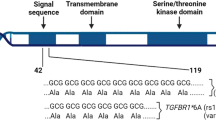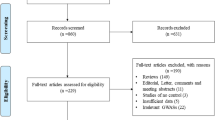Abstract
Although a number of genetic studies have attempted to link transforming growth factor beta 1 gene (TGFB1) -509 C>T polymorphism to breast cancer, the results were often irreproducible. We therefore aimed to meta-analyze all available case–control studies from the English-published literature to explore the association of this polymorphism with breast cancer. A total of 6 studies with 9 populations involving 10,197 patients and 13,382 controls were identified as of February 20, 2010. A random-effects model was performed irrespective of the between-study heterogeneity. Study quality was assessed in duplicate. The frequencies of TGFB1 -509 T allele in patients and controls ranged from 21.72 to 51.74%, and 24.53 to 52.40%, respectively. The presence of -509 T allele conferred a nonsignificant protective effect on breast cancer [odds ratio (OR) = 0.99; 95% confidence interval (CI) 0.93–1.05; P = 0.72]. This lack of association persisted under co-dominant, dominant, and recessive models. However, exclusion of the initial study significantly strengthened the magnitude of this protective effect. For example, under the dominant assumption, carriers of -509 T allele had a moderate reduced risk for breast cancer compared with the -509 CC homozygous (OR = 0.94; 95% CI 0.88–1.00; P = 0.04). Subgroup analyses by study designs and geographic areas did not substantially affect the present associations. No publication biases were observed by the fail-safe number. Taken together, our results demonstrated that TGFB1 -509 T allele was associated with a reduced risk to develop breast cancer and this allele appeared to act in an additive mode.



Similar content being viewed by others
References
Parkin DM (2001) Global cancer statistics in the year 2000. Lancet Oncol 2:533–543
Antoniou AC, Pharoah PD, McMullan G, Day NE, Ponder BA, Easton D (2001) Evidence for further breast cancer susceptibility genes in addition to BRCA1 and BRCA2 in a population-based study. Genet Epidemiol 21:1–18
Feuk L, Carson AR, Scherer SW (2006) Structural variation in the human genome. Nat Rev Genet 7:85–97
Parl FF, Dawling S, Roodi N, Crooke PS (2009) Estrogen metabolism and breast cancer: a risk model. Ann N Y Acad Sci 1155:68–75
Ahmed M, Lalloo F, Evans DG (2009) Update on genetic predisposition to breast cancer. Expert Rev Anticancer Ther 9:1103–1113
Grainger DJ, Heathcote K, Chiano M, Snieder H, Kemp PR, Metcalfe JC, Carter ND, Spector TD (1999) Genetic control of the circulating concentration of transforming growth factor type beta1. Hum Mol Genet 8:93–97
Shin A, Shu XO, Cai Q, Gao YT, Zheng W (2005) Genetic polymorphisms of the transforming growth factor-beta1 gene and breast cancer risk: a possible dual role at different cancer stages. Cancer Epidemiol Biomarkers Prev 14:1567–1570
Dunning AM, Ellis PD, McBride S, Kirschenlohr HL, Healey CS, Kemp PR, Luben RN, Chang-Claude J, Mannermaa A, Kataja V, Pharoah PD, Easton DF, Ponder BA, Metcalfe JC (2003) A transforming growth factor beta1 signal peptide variant increases secretion in vitro and is associated with increased incidence of invasive breast cancer. Cancer Res 63:2610–2615
Jin Q, Hemminki K, Grzybowska E, Klaes R, Söderberg M, Zientek H, Rogozinska-Szczepka J, Utracka-Hutka B, Pamula J, Pekala W, Försti A (2004) Polymorphisms and haplotype structures in genes for transforming growth factor beta1 and its receptors in familial and unselected breast cancers. Int J Cancer 112:94–99
Cox DG, Penney K, Guo Q, Hankinson SE, Hunter DJ (2007) TGFB1 and TGFBR1 polymorphisms and breast cancer risk in the Nurses’ Health Study. BMC Cancer 7:175
Jakubowska A, Jaworska K, Cybulski C, Janicka A, Szymańska-Pasternak J, Lener M, Narod SA, Lubiński J, IHCC-Breast Cancer Study Group (2009) Do BRCA1 modifiers also affect the risk of breast cancer in non-carriers? Eur J Cancer 45:837–842
The MARIE-GENICA Consortium on Genetic Susceptibility for Menopausal Hormone Therapy Related Breast Cancer Risk (2009) Polymorphisms in the BRCA1 and ABCB1 genes modulate menopausal hormone therapy associated breast cancer risk in postmenopausal women. Breast Cancer Res Treat. doi:10.1007/s10549-009-0489-8
Higgins JP, Thompson SG, Deeks JJ, Altman DG (2003) Measuring inconsistency in meta-analyses. BMJ 327:557–560
Cohn LD, Becker BJ (2003) How meta-analysis increases statistical power. Psychol Methods 8:243–253
Borenstein M, Hedges LV, Higgins JPT, Rothstein HR (2009) Introduction to meta-analysis. Wiley, Chichester, UK
Lohmueller KE, Pearce CL, Pike M, Lander ES, Hirschhorn JN (2003) Meta-analysis of genetic association studies supports a contribution of common variants to susceptibility to common disease. Nat Genet 33:177–182
Grainger DJ, Witchell CM, Metcalfe JC (1995) Tamoxifen elevates transforming growth factor-beta and suppresses diet-induced formation of lipid lesions in mouse aorta. Nat Med 1:1067–1073
Janda E, Lehmann K, Killisch I, Jechlinger M, Herzig M, Downward J, Beug H, Grünert S (2002) Ras and TGFβ cooperatively regulate epithelial cell plasticity and metastasis: dissection of Ras signaling pathways. J Cell Biol 156:299–313
Dickson RB, Kasid A, Huff KK, Bates SE, Knabbe C, Bronzert D, Gelmann EP, Lippman ME (1987) Activation of growth factor secretion in tumorigenic states of breast cancer induced by 17 beta-estradiol or v-Ha-ras oncogene. Proc Natl Acad Sci USA 8:837–841
Greene CS, Penrod NM, Williams SM, Moore JH (2009) Failure to replicate a genetic association may provide important clues about genetic architecture. PLoS One 4:e5639
Yu KD, Di GH, Fan L, Chen AX, Yang C, Shao ZM (2009) Lack of an association between a functional polymorphism in the interleukin-6 gene promoter and breast cancer risk: a meta-analysis involving 25,703 subjects. Breast Cancer Res Treat. doi:10.1007/s10549-009-0706-5
Qiu LX, Yao L, Mao C, Chen B, Zhan P, Yuan H, Xue K, Zhang J, Hu XC (2010) Lack of association between MnSOD Val16Ala polymorphism and breast cancer risk: a meta-analysis involving 58,448 subjects. Breast Cancer Res Treat. doi:10.1007/s10549-010-0777-3
Acknowledgments
This study was financially supported by the Shanghai “Chen Guang” Project (09CG12), the Natural Science Foundation of Shanghai (09ZR1426200), two Excellent Young Teachers Programs, one from Ruijin Hospital (W.N.) and the other from Shanghai City (W.N.), the Science Fund of Shanghai Jiaotong University School of Medicine (09XJ21019), and the National Science Foundation for Young Scientists of China (Grant Number: 30900808).
Author information
Authors and Affiliations
Corresponding author
Rights and permissions
About this article
Cite this article
Niu, W., Qi, Y., Gao, P. et al. Association of TGFB1 -509 C>T polymorphism with breast cancer: evidence from a meta-analysis involving 23,579 subjects. Breast Cancer Res Treat 124, 243–249 (2010). https://doi.org/10.1007/s10549-010-0832-0
Received:
Accepted:
Published:
Issue Date:
DOI: https://doi.org/10.1007/s10549-010-0832-0




